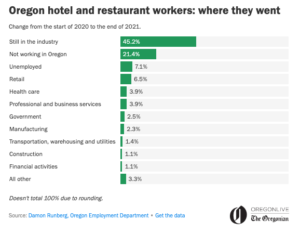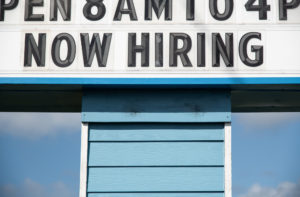
By MIKE ROGOWAY/The Oregonian/OregonLive
Oregon’s economy has recovered all the jobs it lost to the pandemic, bouncing back from record layoffs at a much faster pace than in prior recessions. But the comeback has been much slower in some industries — especially in the hospitality sector.
Hotels, restaurants and bars still have about 12,000 fewer workers than they did before the pandemic, a roughly 6% decline. Employers are still scrambling to fill shifts waiting tables, tending bar and serving takeout.
And yet pandemic-era jobless benefits have long ago expired, and unemployment is near an all-time low. So where did those hotel and restaurant workers go?

Economist Damon Runberg crunched the numbers for the Oregon Employment Department to find out.
Using wage records and unemployment insurance claims, Runberg found that the largest group, by far, still works in the hospitality industry. But thousands of other bar and restaurant workers bolted for other industries – mostly retail, health care and business services jobs.
Such professions often pay better wages, with more regular hours, than bars, restaurants and hotels. And with Oregon experiencing a broad labor shortage, workers naturally gravitated toward the best opportunities. Runberg found the exodus from hospitality to other industries was faster than before the pandemic.
Curiously, the number of Oregon hospitality workers on the jobless rolls quadrupled between the start of 2020 and the end of 2021. That’s despite the number of overall Oregon jobless claims hovering near a historic low, around 4.0%.
In Lincoln County, 4,880 jobs were lost in April 2020 as the pandemic hit, and the county remains 780 jobs below its pre-pandemic employment of August 2019

Runberg thinks the most likely explanation is that restaurants and bars were laying off staff last fall — the latest period for which he has data — during a fresh round of infections driven by highly contagious COVID-19 variants. That may have been a passing phenomenon – the hospitality sector has grown at a 9.9% annual rate over the past year.
Unemployment certainly doesn’t account for all the missing hospitality workers. More than 20% in Runberg’s survey weren’t working in Oregon at all.
“Where is this mystery 1 in 5 workers that have disappeared from our employment records in Oregon? We don’t know,” Runberg said.
Some might have retired, died, gone back to school or moved to another state.
Crucially, though, the share of hospitality workers that left the Oregon work force altogether was roughly on par with the number who left during a similar period before the pandemic. That suggests that most people kept working, even if they didn’t stay in hospitality jobs.
Tallying up the changes, then, Runberg finds no one single answer to the missing hospitality workers. Rather, it’s a combination of factors — people moving, taking new jobs, or dropping out of the workforce altogether.

And Runberg suspects there’s another factor contributing to the hospitality labor shortage that isn’t captured in the data: Hospitality jobs used to be some of the easiest to get for entry-level workers building their resumes and developing their skills. So they were willing to accept the hard work and night shifts to get a start.
Now, though, Runberg thinks those new workers may be finding better opportunities outside the hospitality industry.
“With a high demand for labor across many industries it is also possible that many workers entering the workforce (largely young people) who would typically find a job in a restaurant or hotel are finding work in different industries with more consistent hours and less seasonality,” he said.
- This story first appeared Sept. 23 on OregonLive and in The Oregonian newspaper


